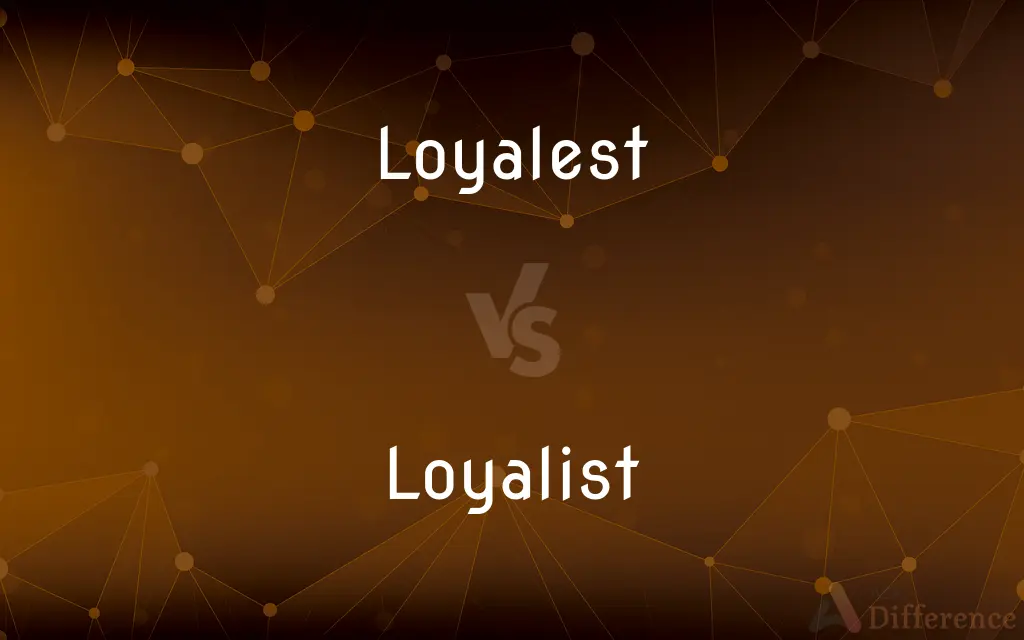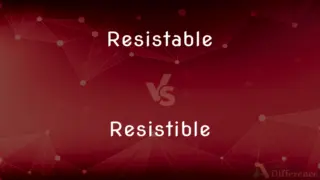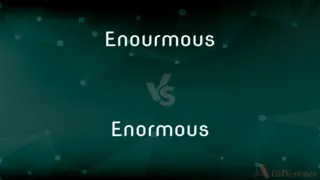Loyalest vs. Loyalist — Which is Correct Spelling?
By Tayyaba Rehman — Updated on March 21, 2024
"Loyalest" is a misspelling. The correct term is "Loyalist," referring to someone loyal to a specific cause or regime.

Table of Contents
Which is correct: Loyalest or Loyalist
How to spell Loyalist?

Loyalest
Incorrect Spelling

Loyalist
Correct Spelling
ADVERTISEMENT
Key Differences
Think of historic contexts like "American Loyalists" to remember the term.
Focus on the root "Loyal" and then add "-ist" for "Loyalist."
"Loyalest" suggests the superlative form of loyal, which is not the intended meaning.
Repeat "Loyal-ist" emphasizing the person aspect.
Remember that "Loyalist" denotes a person, not a degree of loyalty.
ADVERTISEMENT
How Do You Spell Loyalist Correctly?
Incorrect: As a loyalest, he faced criticism from those who supported independence.
Correct: As a loyalist, he faced criticism from those who supported independence.
Loyalist Definitions
A person who remains loyal to the established ruler or government.
He was a Loyalist during the Revolutionary War.
Someone devoted to a particular cause or group.
She was a Loyalist to her political party.
A supporter maintaining allegiance especially during conflict.
The king's Loyalists defended the castle.
An individual committed to a leader or system.
He became a Loyalist of the movement.
A dedicated advocate for a belief or regime.
The group consisted mainly of Loyalists.
One who maintains loyalty to an established government, political party, or sovereign, especially during war or revolutionary change.
Loyalist See Tory.
Loyalist One who supported the established government of Spain during the Spanish Civil War.
A person who is loyal to a cause, generally used as a political affiliation.
A person who adheres to his sovereign or to the lawful authority; especially, one who maintains his allegiance to his prince or government, and defends his cause in times of revolt or revolution.
A person who is loyal to their allegiance (especially in times of revolt)
Loyalist Meaning in a Sentence
She wore a pin to signify her status as a loyalist in the political movement.
As a loyalist, she often found herself in debates with her friends who had different views.
He was known as a loyalist because of his unwavering support for the government.
The book club chose a novel about a loyalist during the civil war.
The teacher explained the loyalist point of view during the independence movement.
The loyalist movement gained momentum in the northern regions of the country.
He identified himself as a loyalist, always sticking by the side of the establishment.
The loyalist group published a newsletter to spread their message.
He wrote letters to the editor expressing his loyalist perspective on the issue.
She researched her ancestor's role as a loyalist in the American Revolution.
She found a series of letters written by a loyalist that offered insight into his life.
During the debate, he proudly declared himself a loyalist to the cause.
Common Curiosities
Why is it called Loyalist?
It's called "Loyalist" because it denotes a person showing loyalty to a specific cause, regime, or government.
Which vowel is used before Loyalist?
Typically, the vowel "a" as in "a Loyalist."
What is the root word of Loyalist?
The root word is "Loyal."
What is the plural form of Loyalist?
The plural form is "Loyalists."
Which preposition is used with Loyalist?
Various prepositions can be used, but "of" is common, as in "Loyalists of the king."
Which conjunction is used with Loyalist?
Any conjunction can be used based on the sentence's context.
What is the verb form of Loyalist?
"Loyalist" doesn't have a verb form as it's a noun.
What is the pronunciation of Loyalist?
Loyalist is pronounced as "LOY-uh-list."
What is the singular form of Loyalist?
The singular form is "Loyalist."
Is Loyalist a noun or adjective?
"Loyalist" is a noun.
Is the word Loyalist imperative?
No, "Loyalist" is not in the imperative form.
Which article is used with Loyalist?
Both "a" and "the" can be used, depending on context.
Is the Loyalist term a metaphor?
Not inherently, but it can be used metaphorically in some contexts.
Is the word “Loyalist” a Direct object or an Indirect object?
"Loyalist" can be used as either, depending on the sentence.
What is a stressed syllable in Loyalist?
The first syllable "Loy" is stressed in "Loyalist."
What is another term for Loyalist?
Another term could be "supporter" or "adherent."
What is the opposite of Loyalist?
The opposite could be "rebel" or "traitor," especially in historical contexts.
Is Loyalist an adverb?
No, "Loyalist" is not an adverb.
Is Loyalist a vowel or consonant?
"Loyalist" is a word containing both vowels and consonants.
Is Loyalist a collective noun?
No, "Loyalist" is not a collective noun.
How is Loyalist used in a sentence?
"Many Loyalists fled to Canada after the American Revolution."
Is Loyalist a negative or positive word?
"Loyalist" is neutral, but its connotation can vary based on historical and contextual usage.
Is Loyalist a countable noun?
Yes, "Loyalist" is a countable noun.
How do we divide Loyalist into syllables?
Loyalist can be divided as "Loy-al-ist."
What part of speech is Loyalist?
"Loyalist" is a noun.
Is Loyalist an abstract noun?
No, it's a concrete noun representing a specific group of people.
Is the word Loyalist a gerund?
No, "Loyalist" is not a gerund.
How many syllables are in Loyalist?
There are three syllables in "Loyalist."
Which determiner is used with Loyalist?
Common determiners like "the" or "a/an" can be used.
Share Your Discovery

Previous Comparison
Resistable vs. Resistible
Next Comparison
Enourmous vs. EnormousAuthor Spotlight
Written by
Tayyaba RehmanTayyaba Rehman is a distinguished writer, currently serving as a primary contributor to askdifference.com. As a researcher in semantics and etymology, Tayyaba's passion for the complexity of languages and their distinctions has found a perfect home on the platform. Tayyaba delves into the intricacies of language, distinguishing between commonly confused words and phrases, thereby providing clarity for readers worldwide.













































